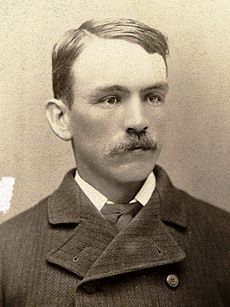| Lorin C. Woolley | |
|---|---|
 Woolley in 1882 | |
| Senior Member of the Priesthood Council | |
| December 13, 1928 – September 19, 1934 | |
| Predecessor | John W. Woolley |
| Successor | J. Leslie Broadbent (fundamentalists)[1] John Y. Barlow (FLDS Church)[2][3] |
| Personal details | |
| Born | Lorin Calvin Woolley October 23, 1856 Great Salt Lake City, Utah Territory, U.S. |
| Died | September 19, 1934 (aged 77) Centerville, Utah, U.S. |
| Resting place | Centerville City Cemetery 40°54′47″N 111°52′05″W / 40.913°N 111.868°W |
| Spouse(s) | Sarah Ann Roberts, Goulda Kmetzsch, possibly others |
| Children | 9 |
| Parents | John W. Woolley Julia Searles Ensign |
| Signature | |
 | |
Lorin Calvin Woolley (October 23, 1856 – September 19, 1934) was an American proponent of plural marriage and one of the founders of the Mormon fundamentalist movement. As a young man in Utah Territory, Woolley served as a courier and bodyguard for polygamous leaders of the Church of Jesus Christ of Latter-day Saints (LDS Church) in hiding during the federal crusade against polygamy. His career as a religious leader in his own right commenced in the early twentieth century, when he began claiming to have been set apart to keep plural marriage alive by church president John Taylor in connection with the 1886 Revelation.[5][6] Woolley's distinctive teachings on authority, morality, and doctrine are thought to provide the theological foundation for nearly ninety percent of Mormon fundamentalist groups.[7]
- ^ Hales, Brian C. "J. Leslie Broadbent". mormonfundamentalism.com. Archived from the original on 26 December 2013. Retrieved 18 March 2014.
- ^ "Official website of the Fundamentalist Church of Jesus Christ of Latter-Day Saints: President Lorin C. Woolley". Archived from the original on 2008-09-28. Retrieved 2009-06-09.
{{cite web}}: CS1 maint: bot: original URL status unknown (link) - ^ Jeffs (1997, p. 243).
- ^ D. Michael Quinn, "Plural Marriage and Mormon Fundamentalism," in Martin E. Marty and R. Scott Appleby, eds., Fundamentalisms and Society: Reclaiming the Sciences, Education, and the Family, Vol. 2 of the Fundamentalism Project of the American Academy of Arts and Sciences (Chicago: University of Chicago Press, 1993), 244.
- ^ Altman & Ginat (1996, pp. 43–44).
- ^ Driggs (1990, p. 40).
- ^ Hales (2006, p. 433).